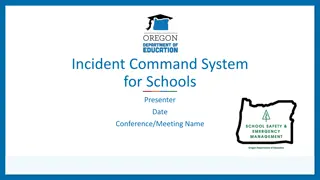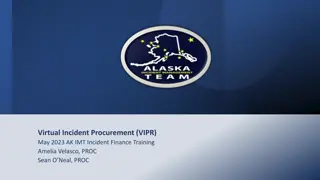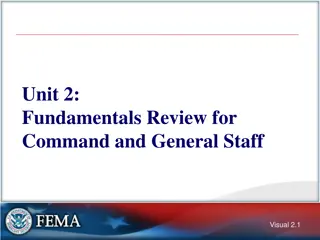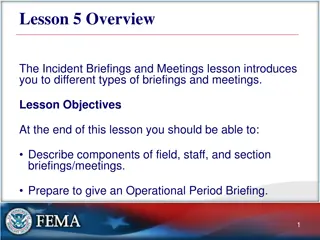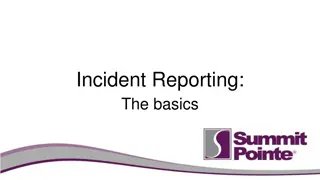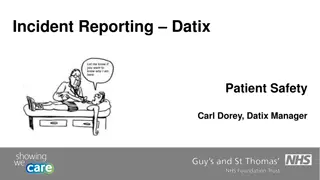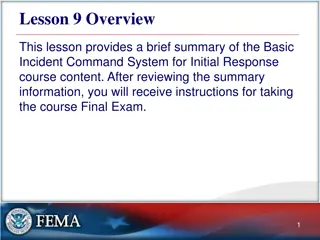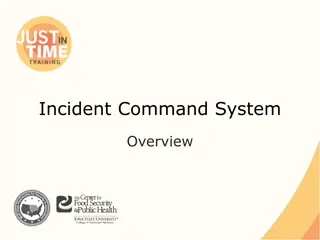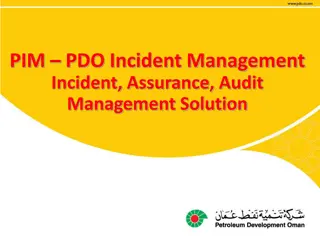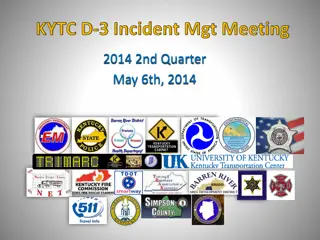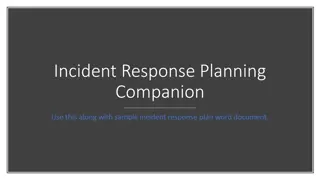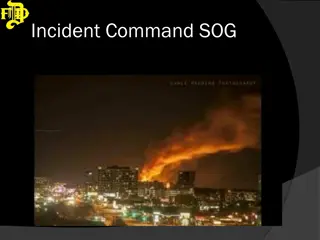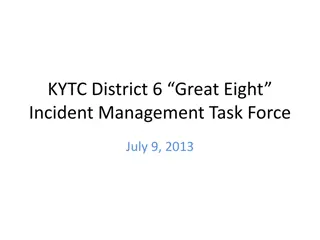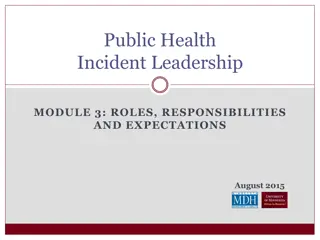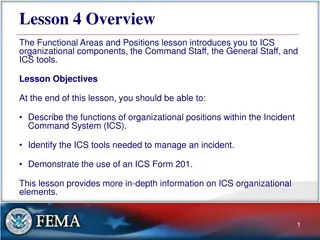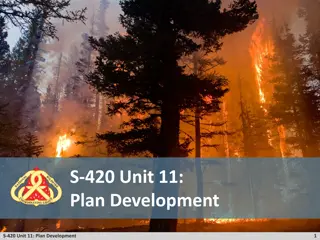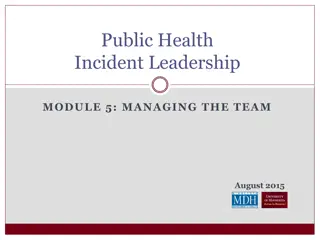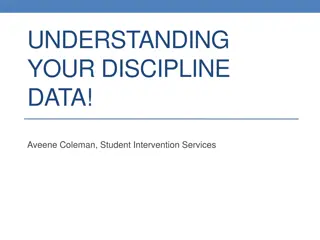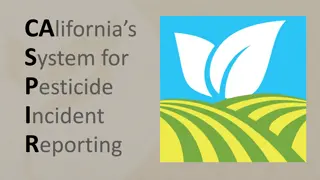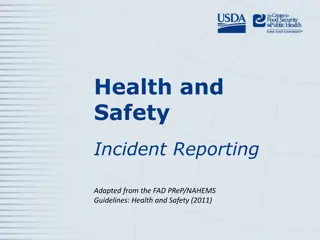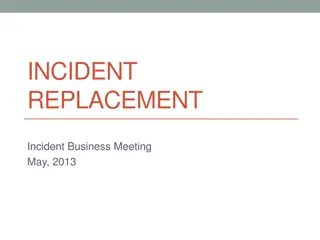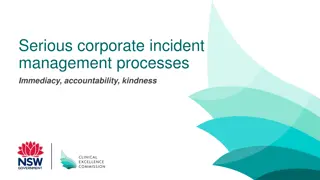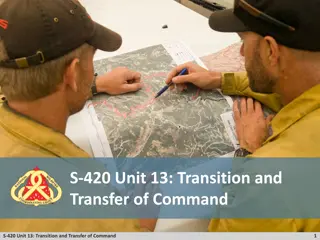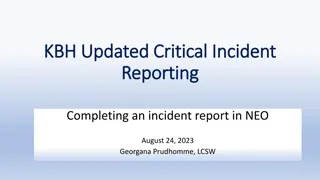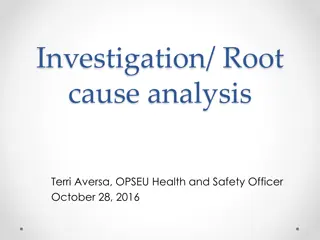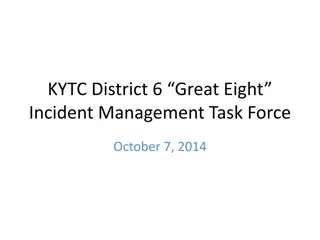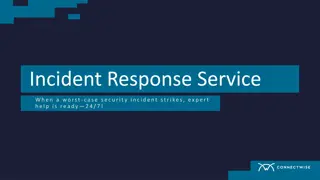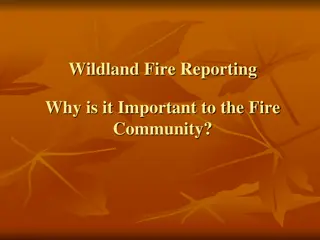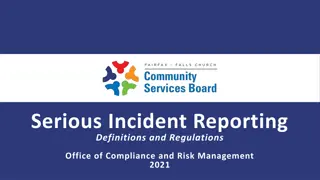Understanding Critical and Non-Critical Incidents in Incident Reporting
Critical incidents, as defined by regulations, are serious events that pose immediate risk to health, safety, or welfare. Non-critical incidents, on the other hand, are minor in nature and do not have serious consequences. Incident reports play a crucial role in documenting occurrences, identifying
0 views • 29 slides
ECC Social Value Reporting and Evaluation Framework
Essex County Council (ECC) has implemented a robust Social Value Reporting and Evaluation framework based on the Local Government Association's National TOMs method. This framework categorizes and assesses social value contributions in two parts - Value Score and Supporting Statement Score - to deri
3 views • 16 slides
Effective Incident Briefings and Meetings Overview
This lesson covers various types of briefings and meetings within the Incident Command System (ICS), including field, staff, and section briefings. It explores the Incident Action Planning Process for developing the IAP, emphasizing the importance of effective communication in incident management. T
0 views • 14 slides
Comprehensive Overview of Incident Command System for Schools
This presentation provides a detailed insight into the Incident Command System (ICS) for schools, outlining its purpose, structure, key concepts, and how individuals can fit into an ICS during emergencies. Topics covered include coordination with community partners, the importance of ICS, its struct
2 views • 16 slides
Understanding Virtual Incident Procurement (VIPR) in Government Agencies
Virtual Incident Procurement (VIPR) is a web-based system used by the United States Department of Agriculture, Forest Service (USDA-FS) for incident procurement. It includes Incident Blanket Purchase Agreements (I-BPA) that allow Contracting Officers to create, award, and manage solicitation and agr
3 views • 37 slides
Understanding the Patient Safety Incident Response Framework (PSIRF)
The Patient Safety Incident Response Framework (PSIRF) is set to replace the Serious Incident Framework (2015) within the NHS, marking a significant shift in responding to patient safety incidents. Its key aims include compassionate engagement, system-based learning, proportionate responses, and sup
5 views • 9 slides
Incident Management Fundamentals and Command Structure Review
Explore key NIMS doctrine concepts, agency policies, incident complexity factors, and Unified Command functions in managing complex incidents or events. Learn about Incident Action Planning, transfer of command, and the roles of Command and General Staff positions. Gain insights into incident comple
0 views • 11 slides
Incident Briefings and Meetings: Overview and Best Practices
This lesson covers various types of briefings and meetings within the Incident Command System (ICS), such as field, staff, and section briefings. Learn how to prepare and conduct operational period briefings effectively, understand the Incident Action Planning Process, and master the art of deliveri
2 views • 14 slides
Understanding Critical Incident Stress Management (CISM)
Critical Incident Stress Management (CISM) is crucial for addressing the emotional, physical, and psychological reactions to overwhelming events. This includes definitions of critical incidents, CISM teams, peer support, and crisis response teams. Learn how the International Critical Incident Stress
2 views • 25 slides
Incident Reporting: Guidelines and Procedures
Guidelines for incident reporting including when to write a report, how to structure it, what to do after submission, where to send reports, signs of misuse, and whom to contact with questions. Stay vigilant to ensure accurate reporting and follow proper procedures to maintain a safe environment.
2 views • 7 slides
Understanding Incident Reporting in Healthcare
Incident reporting in healthcare is crucial for patient safety and organizational improvement. An incident can encompass a wide range of events that cause or have the potential to cause harm, loss, or damage. Reporting incidents, including near misses, allows for learning from both mistakes and succ
0 views • 10 slides
Basic Incident Command System Overview
This lesson provides a summary of the Basic Incident Command System for Initial Response course content. It covers the NIMS framework, ICS management systems, incident command structure, unity of command, communication protocols, delegation of authority, and management by objectives. Understanding t
5 views • 15 slides
Incident Command System Overview and Structure
Incident Command System (ICS) provides a standardized approach to incident management. It offers flexibility, adaptability, and efficient management for incidents of varying sizes and complexities. ICS consists of top-down structure with key functions like logistics, operations, planning, finance/ad
1 views • 22 slides
Upgrade Highlights: Incident and Action Modules Enhancements
Explore the latest upgrades in the incident and action modules, including improved navigation, enhanced access controls, workflow changes, and new feature implementations like transportation consequences. Stay updated on the revamped Incident Management and Audit Solutions for efficient incident han
0 views • 10 slides
KYTC.D-3 Incident Management Meeting 2nd Quarter May 6th, 2014
The KYTC.D-3 Incident Management Meeting for the 2nd quarter of 2014 held on May 6th discussed various topics including recent incidents, emergency plans, construction projects, spill cleanup, and upcoming training opportunities. Detailed incidents such as crashes and fires on I-65 and Nunn Pkwy wer
0 views • 24 slides
Cyber Incident Response Planning and Team Organization
This comprehensive incident response planning companion provides guidelines for creating effective policies and plans, emphasizing the importance of customization to suit each agency's unique circumstances. It outlines the purpose, objectives, and structure of an incident response plan, along with t
0 views • 16 slides
Incident Command Structure and Span of Control Overview
Incident Command Structure helps in managing incidents effectively by utilizing ICS terminology and levels as needed. The flexibility within ICS allows for structuring incidents correctly based on individual needs. Understanding the Span of Control is crucial for supervisors to manage the number of
2 views • 24 slides
UNEP Support for Improving UNCCD Reporting Procedures
UNEP has been providing support since 2010 to enhance the reporting processes of the UNCCD, focusing on streamlined funding approaches, technical assistance, and capacity building. Key outcomes include the development of reporting tools, online reporting systems, and building credible data from coun
0 views • 14 slides
KYTC District 6 Great Eight Incident Management Task Force Meeting Recap
Recap of the KYTC District 6 Great Eight Incident Management Task Force meeting held on July 9, 2013. The meeting covered incident reviews including a truck fire and fuel spill in Harrison County, responsibilities for debris removal after a truck/camper crash in Carroll County, a two semi crash in G
0 views • 44 slides
Transitioning to Incident-Based Crime Reporting: Enhancing Transparency and Accountability
Anytown Police Department (APD) is leading the transition from Summary Reporting to Incident-Based Reporting through the National Incident-Based Reporting System (NIBRS). This change promotes transparency, provides detailed crime data to the public, and improves statewide and national crime statisti
3 views • 17 slides
Public Health Incident Leadership: Roles, Responsibilities, and Expectations
Explore the positions, responsibilities, and expectations within the Incident Command System in public health incidents. Learn about the Incident Commander's role, the need for timely decision-making, and the structure of the Incident Command System. Understand the importance of common processes and
0 views • 37 slides
Understanding Incident Command System (ICS) Organizational Components
This lesson introduces the key components of the Incident Command System (ICS), including the Command Staff, General Staff, and essential tools. It covers the roles of the Incident Commander, Deputy Incident Commander, and Command Staff positions, emphasizing their functions in managing incidents ef
0 views • 40 slides
Incident Management Plan Development Process Overview
The incident management plan development process involves activities such as preparation for tactics meeting, conducting the tactics meeting, and preparing for the planning meeting. The tactics meeting is crucial for breaking down overall incident objectives into tactical assignments for the next op
0 views • 8 slides
Effective Management of Public Health Incidents: Objectives and Team Leadership
Learn the importance of distinguishing between management objectives and incident objectives, linking objectives to response activities, and leading an Incident Management Team through the Planning P process. Explore the difference between general management objectives and operational incident objec
0 views • 28 slides
Understanding Discipline Data Collection in Educational Institutions
The data illustrate the importance of accurately reporting discipline and truancy data using Incident Management Systems in educational institutions for the 2019-20 school year. The process involves coding data in Incident Management, avoiding additional codes, and adhering to federal reporting requ
0 views • 60 slides
California's System for Pesticide Incident Reporting Overview
Explore California's CASPIR system for reporting pesticide incidents, designed to enhance communication between counties, DPR, and fieldworker groups. The system's timeline, purpose, and key features, including incident report submission, intelligent case routing, mobile app functionality, and admin
0 views • 33 slides
Health and Safety Incident Reporting Guidelines
Learn about incident reporting procedures adapted from the FAD PReP/NAHEMS guidelines for health and safety incidents. Find out the steps to take when an incident occurs, including reporting requirements, documentation, and workers' compensation processes.
0 views • 14 slides
Lessons Learned from Roanoke City Health Department's Active Shooter Incident
Roanoke City Health Department faced a threat of an active shooter in 2016. The incident prompted immediate response actions, including mobilizing an incident command team and enhancing security measures. Transitional responses involved state-level collaboration for investigation and operational sec
0 views • 10 slides
Incident Replacement Procedures and Guidelines in Business Meetings
Explore the process of incident replacement in business meetings, including who needs replacement items, approval authorities, and necessary forms to complete. Reference materials such as the IIBMH handbook and NWCG guidelines provide detailed insights into managing incidents effectively. Understand
0 views • 25 slides
Simpler Systems Reporting Pilot for Financial Data Enhancement
The Simpler Systems Reporting Pilot is underway to enhance financial data reporting at the university campus. Led by Vice President Ryan Nesbit's team, this initiative aims to improve University-wide financial reporting mechanisms and accessibility to data through the Simpler tool. The pilot include
0 views • 5 slides
Ensuring Chemical Reporting and Preparedness at the DEQ
The Chemical Reporting and Preparedness section at the DEQ focuses on regulations under EPCRA, prompted by incidents like the Bhopal tragedy. EPCRA covers Tier II reporting, spill reporting, LEPCs, State Emergency Response Commission, and Oklahoma Hazardous Materials Emergency Response Commission. T
0 views • 17 slides
Corporate Incident Management Processes and Policy Update
Explore the corporate incident management processes and policy updates focusing on immediacy, accountability, and kindness. Learn about incidents, harm scores, and revised process steps outlined by the Clinical Excellence Commission and NSW Health. Discover the differences between the current and re
0 views • 17 slides
Transition and Transfer of Incident Command
Ensuring effective transition and transfer of incident command is crucial for incident management. This involves activities such as demobilization planning, transfer of command planning, incident package creation, and more. Detailed plans need to be in place to facilitate a smooth handover of author
0 views • 12 slides
Understanding Critical Incident Reporting in Behavioral Health Services
Behavioral health services providers like KBH are required to report and track critical incidents and sentinel events in order to ensure client safety and program integrity. This involves identifying trends, reporting abuse, and following specific reporting processes set by accrediting bodies. The N
0 views • 29 slides
Workplace Incident Investigation and Root Cause Analysis
Workplace incident investigations are crucial for preventing future incidents. They help determine what happened, identify causes, and uncover unsafe conditions or procedures. By conducting thorough investigations, management can take corrective actions and demonstrate commitment to safety. Understa
0 views • 17 slides
KYTC District 6 Incident Management Task Force Meeting Summary
The meeting of the KYTC District 6 Great Eight Incident Management Task Force on October 7, 2014, covered various incident reviews including the I-75 Brent Spence Bridge crash and an overturned semi on US 42. The meeting included introductions, approval of previous meeting minutes, and discussions o
0 views • 48 slides
ConnectWise Incident Response Service: Expert Help for Security Incidents
ConnectWise Incident Response Service offers expert assistance 24/7 for handling worst-case security incidents. Gain direct access to incident response analysts, real-time management, recovery procedures, insights on attacker tactics, and post-incident monitoring. Choose from flexible service option
0 views • 13 slides
Feedback Analysis on Medication Incident Reporting in Hospitals
Feedback received from IMSN members on NIMS and incident reporting revealed various issues affecting the rates at which staff report medication incidents/near misses within hospitals. Major themes included staffing numbers and turnover, pharmacist involvement in incident reporting, clinical pharmacy
0 views • 12 slides
Importance of Wildland Fire Reporting to the Fire Community
Wildland fire reporting plays a critical role in providing accurate data for effective fire management. Defined state fires and challenges in reporting impact funding, risk management, and agency support. Comprehensive reporting like the Wildland Fire Occurrence Reporting for Massachusetts is essent
0 views • 6 slides
Understanding Serious Incident Reporting Regulations in Behavioral Health Services
Explore the definitions and regulations surrounding serious incident reporting in behavioral health services, focusing on the role of regulatory bodies like DBHDS and the guidelines provided in the Virginia Administrative Code. Learn about the impact of accurate reporting on ensuring compliance and
0 views • 16 slides



